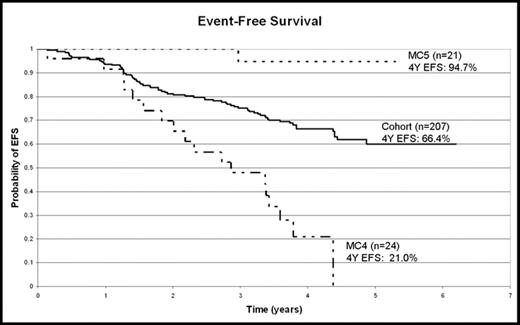Abstract
While 80% of children with B-ALL achieve long term survival, a significant number still relapse. In contrast to low and intermediate risk ALL, the biologic and genetic features of high risk disease have not been well characterized. COG P9906, testing an augmented BFM regimen, enrolled 271 B-ALL patients from 2000–2003 who were predicted to have poor outcomes based on prior trials. To study the heterogeneity of high risk B-ALL and to identify novel therapeutic targets, we obtained gene expression profiles (Affymetrix HG-U133Plus2) from the pre-treatment samples of 207/271 children on COG P9906. This cohort had a mean age of 10.9 yrs, a male predominance (66%), and a 4 year event free survival (EFS) of 61%. Patients with favorable (TEL-AML/trisomy 4+10) or very unfavorable (BCR-ABL/hypodiploidy) genetic features were excluded. While the cohort contained 20 cases with MLL rearrangements and 23 with E2A-PBX, the remainder had no known recurring genetic abnormalities. Using two unsupervised clustering methods (VxInsight, Hierarchical Clustering), an established method to identify outlier genes (COPA), and a novel method we developed to find genes tightly associated with recurring genetic abnormalities (ROSE), we identified 7 distinct cluster groups. Two of these clusters contained the MLL and E2A-PBX cases, while a third had cases with expression profiles similar to E2A-PBX but lacked the fusion transcript. Four clusters were completely novel and two of these were further distinguished by unique clinical and outcome features (see Fig.). One novel cluster (MC5) had strikingly favorable EFS (94.7% at 4 yrs.) with older children (mean age 14.1 yr) who were predominantly male (4:1). Highly expressed genes distinguishing this cluster included BRDG1, CABLES1, CENTG2, CHST2, MCAM and PTPRM. This cluster is very similar to the novel cluster previously described by Yeoh et al. (
Author notes
Disclosure: No relevant conflicts of interest to declare.


This feature is available to Subscribers Only
Sign In or Create an Account Close Modal